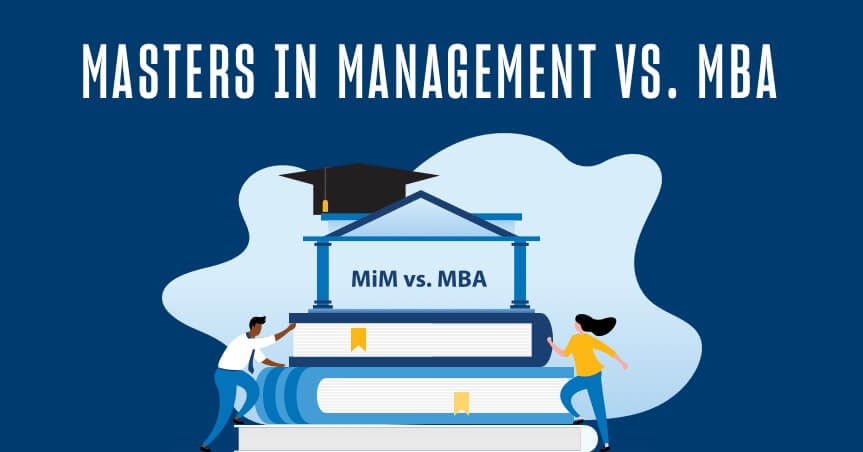For those looking to develop and refine their managerial, communication, financial and analysis skills in the workplace, a Master of Business Administration (MBA) degree is a popular choice. After all, MBAs are internationally recognized degrees that specialize in developing both the soft skills and expert knowledge required for a professional career in business and management. The degree can be well worth the effort. As MBA.com reports, in 2020 new MBA hires started at a median salary of $115,000, higher than both the median for direct-from-industry hires at $95,000 and bachelor’s degree hires at $65,000.
However, an MBA program can also be a substantial investment, with some full-time MBA programs costing more than $100,000 in just a two year period. Before committing to a program, it’s important to understand the available options for advanced degrees in business-related fields, especially when the distinctions might not be so clear.
Depending on your personal situation and work history, an Executive MBA (EMBA) might be a worthwhile alternative to a traditional MBA program. Or, considering your interests and goals, it could be beneficial to consider another type of program entirely.
Get Your Guide: The 4 Ways to Break Into a Tech Career (Plus 8 Lucrative Tech Careers to Pursue)
What Is an MBA?
An MBA is essentially a general management degree designed to train and educate those who are entering the corporate workplace. MBA courses teach the
“basics” of business by covering a wide variety of courses relating to statistics, economics, communications, accounting and management.
Many programs will have a fairly wide variety of class selection and electives. Certain MBA degree programs can specialize in areas of finance, marketing or entrepreneurship, offering less of a general understanding in exchange for a more focused line of study. While there’s generally no required work experience to be accepted into an MBA program, they will require a bachelor’s degree. Top-rated schools will require a high GPA as well as high test scores from the Graduate Management Admission Test (GMAT).
What Is an EMBA?
The Executive Master of Business Administration (EMBA) degree is functionally similar to an MBA – despite what it may sound like it is not a doctorate level degree. EMBA degrees are part-time programs specifically designed for working professionals who are or have been in executive or leadership roles.
The difference between an EMBA and an MBA is that the coursework is less about general knowledge and more focused on refining skills through specific management challenges. While the curriculum tends to be similar, covering areas of accounting, finance and marketing, the EMBA assignments are more about engaging with examples; challenging students to work through actual problems from real companies.
Because most applicants to EMBA programs have been out of school for years, there is less emphasis on academic records for admission. Instead, an applicant’s work experience and professional network will be taken into consideration. Also, though there are no age requirements, EMBA students will tend to skew older than in other MBA programs.
MBA vs. EMBA Comparison
Understanding what distinguishes MBA programs from EMBAs will guide you towards whichever is the better fit for your background, needs and goals. Here are the main breakdowns:
- Work Experience – Prospective MBA students aren’t required to have work experience, though top candidates may have spent a few years in their professional field. EMBA candidates must have extensive workplace experience, at least more than ten years
- Managerial and C-suite Experience – MBA candidates are not expected to have any experience in managerial or executive roles and most likely will have little to none. Top EMBA prospects will have several years of managerial or executive experience.
- Education and GMAT Scores – MBA candidates must have a bachelor’s degree with a respectable GPA (3.5+) and high GMAT scores in the 600-700 range. EMBA assessment for candidates places work experience as primary over education, though either a bachelor’s degree or GMAT scores must be submitted.
- Class Schedule – MBAs can be either full or part-time. While full-time programs require a full commitment, they can be completed in a period of one to two years. Part-time programs are more flexible with scheduling and may take longer, averaging two to three years, though some may go up to five. EMBAs are mostly or entirely part time as they are designed for working students to complete them within 24 months.
- Student Demographics – The average age of MBA students trends in the 20s-30s, while EMBAs are mainly in their 30s and 40s. Part-time MBA students may be working professionals, while full-time students are fully committed to the program. EMBA students are expected to be working professionals.
- Cost – This is fully dependent on several factors, including the reputation of the school, in-state vs. out-of-state tuition, full-time or part-time or online classes. Average MBA tuition tends to be around $40,000, though incidental costs of a full-time program can reach $100,000 with top schools at or over $200,000. EMBA programs tend to be a little more expensive on average, with costs around $55,000 and top schools ranging from $133,000. For either MBAs or EMBAs, expect the cost at top schools to be at or over $200,000.
- Class Size – This is largely dependent on the school and its location, but on average MBAs tend to have larger class sizes than EMBA programs.
- Goals – Individual goals will vary, but in general MBAs are good for those looking to start their professional career at a higher level, make a career change into another profession, advance within their chosen career or specialize in a business focus such as finance or marketing. The goals of EMBA students will be more about furthering their career advancement, developing leadership skills, studying new business trends and filling in existing knowledge gaps.
| MBA | EMBA | |
|---|---|---|
| Previous Education | Bachelor’s degree with high GPA preferred | Bachelor’s degree |
| Years of Work Experience | None required | 10+ |
| Managerial Experience | Little to none | Several years |
| C-suite Experience | Likely none | Possibly some |
| GMAT Scores | Expected 600-700 | Only if no bachelor’s degree |
| Schedule of Classes | Full-time or Part-time | Part-time |
| Length of Program | Full time around 2 years, Part time up to 5 years | 18-24 months |
| Age Range of Students | 20+ | 30+ |
| Price | $40k on average, $100k average for top schools | $55k on average, $133k average for top schools |
| Class Size | Varies by program | Varies by program, trends smaller than MBA programs |
| Career Goals | Start career, Change career, Career advancement, Specialize in specific area | Career advancement, Leadership development, Study emerging trends, Fill in knowledge gaps |
Get Your Guide: The 4 Ways to Break Into a Tech Career (Plus 8 Lucrative Tech Careers to Pursue)
How to Determine Which Program is Right For You
Due to the nature of these two programs, the decision of which is right for you can be fairly straightforward.
If you’re at an early stage in your career, or are looking at exploring a new business career opportunity, and are interested in rounding out your business skills then you’re likely a good fit for an MBA program.
If you’re a working professional with several years of experience, but want to advance to an executive level or need to supplement your existing skills and knowledge, then you need the flexibility and focus of an EMBA program.
There are a couple of other matters to consider as you weigh your options:
Will your workplace sponsor your study and pay for your tuition?
Some businesses will cover the cost of your degree if you’re looking to advance within the company. This can greatly mitigate the cost of an MBA or EMBA program, if not cover it entirely. If your business does offer tuition coverage, be sure to closely review the requirements – such as if you’re required to stay with the company for a set amount of years after earning your degree.
Do you want to work within a company or are you thinking of striking out as an entrepreneur?
It’s possible that the career you want is less about focusing on a specific area of knowledge to advance as a manager, and more about trying to innovate and develop something new. If you’re feeling the drive to start something on your own, then you could be hearing the call of the entrepreneur. If you enjoy the thrill of creating something, but would prefer to stay within your current employment, then you could be an “intrapreneur.” In either case, your area of study may trend towards innovating new products or services, securing available and future finances and being the one to effectively lead your own team – which means you may be more suited towards an MBA alternative.
What are MBA and EMBA alternatives?
- Mini MBA Programs
A mini MBA program provides instruction on business topics for fewer credit hours than a full-time degree program. Since they usually require only 35-40 credit hours, a mini MBA program could be completed in under 6 months, costing much less than full MBA or EMBA degree programs. Admission requirements are also less strict, though some mini MBA programs might require applicants to have established work or “professional” experience to be accepted into the program.Mini MBA programs only offer certificates, not a full master’s degree. As such, this option is more suited towards professionals who are looking to receive more specialized training for career advancement, managers with no prior business school experience who are interested in learning important fundamentals as well as MBA graduates who want to get caught up on new trends and practices. - Starting Your Own Business
If your interest is more about starting your own business, then you may want to consider taking the leap and striking out on your own. There’s certainly a lot of inherent risks in being an entrepreneur, so even if you feel that you possess the skills, knowledge and support you’ll need to get things up and running you’ll want to consider researching more about the recommended steps for starting a business.One possible way to get started is to choose a master’s degree program designed around teaching business creation and development for today’s technology-driven market. A program like the University of San Diego’s Master of Innovation, Technology and Entrepreneurship degree is focused on providing instruction on fundamental business concepts and practices paired with details on technological innovation and financing. This degree program could be the perfect fit for aspiring entrepreneurs in the tech industry. - Consider the MITE Degree
Designed for aspiring entrepreneurs and for those interested in innovating the tech industry, the MITE degree is perhaps the only U.S. master’s program whose one-of-a-kind degree is awarded jointly by schools of Engineering and Business. Its cross-functional leadership training is concentrated on solving day-to-day and strategic challenges, and is developed especially for those professionals interested in joining tech startups or starting a career as an intrapreneur or entrepreneur in a technology-related field.Whether you’re a technology professional interested in learning fundamental and advanced business models, concepts and practices; or a business entrepreneur who wants to navigate the world of technology innovation, financing and product/market – the MITE degree could be perfectly aligned with your interests and goals.
Get Your Guide: The 4 Ways to Break Into a Tech Career (Plus 8 Lucrative Tech Careers to Pursue)




